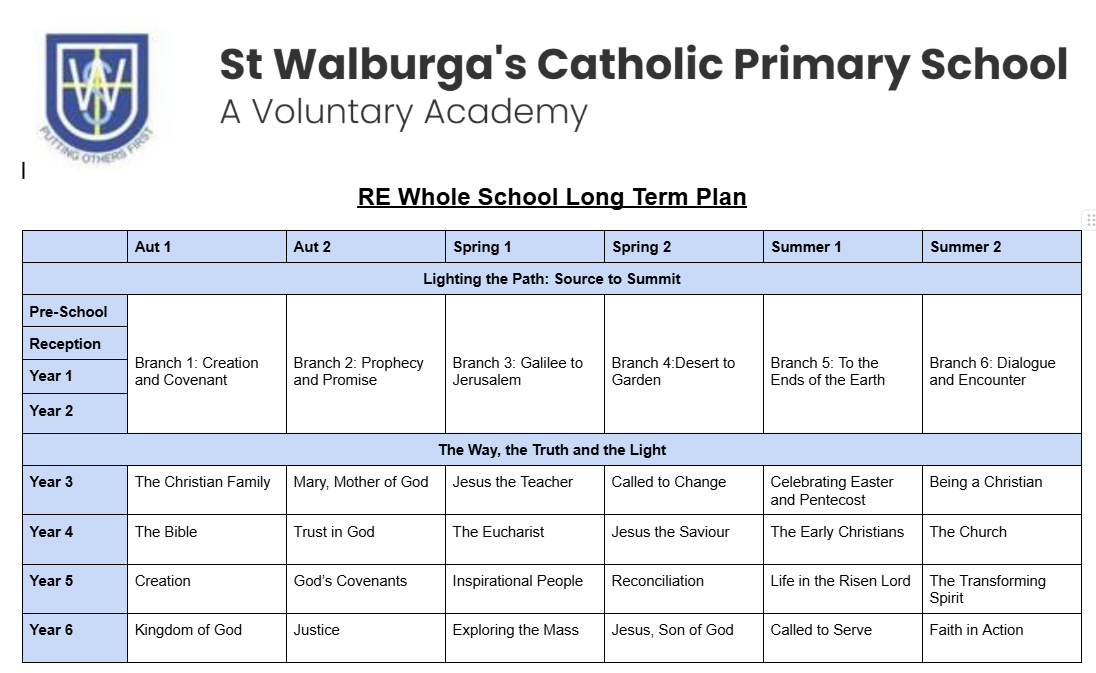Religious Education
Intent:
Religious Education gives us the chance to explore our own faith and the faith of others. It helps us to understand important things about the world and ourselves, to develop our understanding of how we can use our faith to help others and to show empathy and love to all. It also helps us to develop an understanding of the teachings and stories of the Bible and how we can link it to how we live our lives today. We are also inspired by the lives and work of those people who live their lives with Christ at the centre.
Implementation:
Religious Education is the foundation of everything we do at St. Walburga’s, allowing children to grow in faith, taking Jesus as our role model and placing Him at the heart of all our teaching and learning.
In Pre-School, Reception and Key Stage 1, our curriculum follows the Oxford University Press Programme 'Lighting the Path: Sourse to Summit'.
Key Stage 2 follows ‘The Way, The Truth and The Life’ programme.
As a core subject, it is taught for 10% of the curriculum in line with The Bishop’s Conference recommendations.
- Key concepts or themes run through both curricular such as, ‘Creation and Covenant', ‘The Church’, ‘Eucharist’ and ‘Resurrection’. Within year groups, half termly units consist of a sequence of learning focussed on a particular aspect of the theme, illustrated by a ‘Learning Journey’. An emphasis on a creative approach provides children with rich opportunities to ask questions and express their ideas, views and understanding in a variety of ways.
- As children progress through the curriculum, they learn about key scripture and to retell Bible stories. Next, they make links between what they teach us, to the beliefs of the Church and key people of God. By the end of Key Stage 2, children can share and justify their viewpoints and make judgements, using sources to support their reasoning.
- The aforementioned themes that weave through the key stages enable children to regularly revisit their prior learning, aiding retention, build on previous knowledge and embed skills. To the same end, within units, each lesson’s learning builds on the last.
- The teaching of world faiths complements ‘The Way, The Truth and The Life’ curriculum, with children studying three other faiths across the year from Islam, Judaism, Sikhism and Hinduism. Additionally, children apply their skills to learning about the lives and beliefs of their class saint, and reinforce their learning of Catholic Social Teaching through an annual fundraising activity.
- Teachers utilise adaptive teaching strategies to ensure inclusivity, to enable all children to access key learning and to stretch and challenge the most able and curious learners.
Impact
The RE curriculum leads to children who are aware of the Church’s moral values and those of other religions. Children are inspired and imaginations are stimulated to provoke a desire and ability to think deeply. Pupils can relate their Catholic faith to daily life; critical thinking in the context of examining the messages of scripture and how this affects their own lives, and therefore enabling them to apply this same thinking to other subjects in school and in expectations upon them in future life roles. They are able to use their knowledge, understanding and skills to reflect spiritually, morally and theologically on contemporary social and cultural issues.
Long Term Plan






